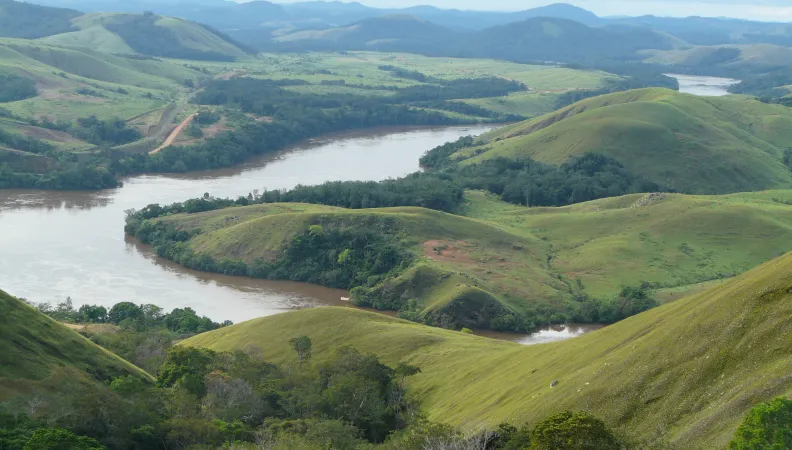Share the page
Support for financial innovation and strengthening of environmental funds in Africa, Latin America, and the Caribbean (REDLAC-CAFE)
Project


-
Project start date
-
Status
Completed
-
Estimated date of project termination
-
-
Project financing date
-
-
Financing duration
-
3 years
-
Type of program
-
FFEM
-
Global financing amount
-
€ 3 807 240
-
FFEM financing amount
-
€ 1 137 400
-
Project lead member institution(s)
-
Ministry for Europe and Foreign Affairs
-
Country and region
-
Latin America, Africa - Multi-country
-
Location
-
Brésil
-
Type of financing
-
Partners
-
members of RedLAC and CAFÉ, MAVA Foundation for Nature, Global Environnment Facility (GEF)
-
Beneficiaries
-
Fonds brésilien de la biodiversité (FUNBIO)
-
Type of beneficiary
-
NGO, Foundation
Strengthen the capacities of Environmental Funds (EF), consolidate the RedLAC and CAFE networks and promote exchange among their members, while developing five innovative financing mechanisms to address conservation challenges related to climate change.
Context
To improve their performance, Environmental Funds (EFs) have formed networks: RedLAC (the Latin American and Caribbean Network of Environmental Funds), established in 1999, and CAFE (the Consortium of African Environmental Funds), more recently created in 2010. The mission of both networks is to address the key challenges faced by EFs, namely operational excellence, innovative financing mechanisms, and impact monitoring. Like other networks, their objectives include capacity building, knowledge exchange, network culture preservation, information sharing, and the development of knowledge and innovation.
This project was built on the lessons learned from the final evaluation of the previous project “RedLAC Capacity Building”, successfully implemented from 2010 to 2014 by the Brazilian EF Funbio, in close collaboration with the RedLAC secretariat and the then-emerging CAFE secretariat. This earlier initiative, co-financed by the FFEM, was organized around similar principles: promoting innovation, sharing experiences, and delivering training through participatory workshops involving members of both RedLAC and CAFE.
Description
The project is structured around four components:
- Innovation Seed Fund for EF Financing Mechanisms
Promote innovation within Environmental Funds (EFs) to increase and diversify their resource base, enabling them to address environmental challenges and support biodiversity and habitat conservation efforts—potentially contributing to climate change mitigation benefits. - Capacity-Building Mechanism, Peer Mentoring, and Knowledge Exchange
Foster the transfer of knowledge and best practices among EFs to stimulate partnerships and further consolidate the network. The strategy for achieving this objective is based on lessons learned from peer mentoring experiences tested in the previous project. - Communication and Database: Strengthening Networks and Showcasing Experiences
Document and disseminate information on EF performance, and capitalize on experiences through a distance learning platform that complements the capacity-building component (Component 2). The RedLAC and CAFE networks aim to develop tools that will remain useful beyond the project, by strengthening the capacity of their organizations to record, share, and replicate best practices. - Institutional Strengthening and Sustainability of the RedLAC and CAFE Networks
Enhance the operational capacity and long-term sustainability of RedLAC and CAFE in areas such as communication, institutional integration, monitoring, network profiling, and the financing of core network activities. This strategy builds on the strong collaboration established to date and emphasizes the need to continue fostering synergies and connections among EFs on both continents. It also draws from RedLAC’s experience in governance, financial models, and coordination, while taking into account the distinct characteristics and long-term development needs of each network.
Outcomes
- Innovate, expand, and scale up the portfolios of Environmental Funds (EFs) dedicated to financing conservation efforts related to climate change, both in terrestrial and marine ecosystems.
- Continue the implementation of biodiversity impact monitoring methods developed by EFs, and support the work of a dedicated task force exploring additional monitoring tools—particularly for marine environments and other simplified monitoring approaches.
- Strengthen capacities and exchanges among members of the CAFE and RedLAC networks, including engagement with other networks from Asia and the Pacific, as well as the Conservation Finance Alliance (CFA).
- Contribute to global dialogue and thinking on all aspects of biodiversity conservation financing in connection with climate change mitigation and adaptation.


